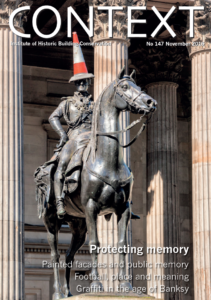 The latest edition of Context is themed on protecting memory and managing change – looking at the practices, processes and laws that ensure the historic environment can be preserved.
The latest edition of Context is themed on protecting memory and managing change – looking at the practices, processes and laws that ensure the historic environment can be preserved.
Context editorial writes:
‘The role of the conservation profession in keeping memories of events, people, places and experiences alive is as vital as the preservation of the venerated physical structure. The articles in this edition demonstrate the various ways in which the conservation profession is consistently negotiating this relationship through a conscious reflection on existing processes, practices and laws to ensure that a range of different memories embedded in the physical fabric are protected, and thus capable of recollection and reinterpretation into the future.’
Articles include:
- Protecting memory through national designation
Historic Environment Scotland is consulting about how to demonstrate in a public way how works of art and other objects in the environment are valued. - Diversity on the list
Historic England is developing the listing process to reflect multiple values and a new appreciation of the diverse range of stories in the historic environment. - Valuing fitness for purpose
Assessments of how well buildings perform (and have done) affect how their quality and value are perceived, and decisions about whether or not they should be protected. - Painted facades and public memory
As a visually dramatic means of story-telling, large-scale murals can be an effective way to engage communities and communicate public memory to multiple audiences. - Graffiti in the age of Banksy
At a time when Historic England has been working to get prosecutors and the courts to take graffiti on heritage sites more seriously, some graffiti is being regarded as a heritage asset. - Playing for extra time
The heritage of sport is being appreciated as one dimension of the historic environment and, in the case of football, it is a keenly distinctive aspect of place, memory and meaning
Other articles in the edition include:
- A lairdhouse in modern Glasgow
Close analysis of its building materials have shed light on how Provan Hall, a medieval country home and one of Glasgow’s less well known historic buildings, was constructed. - A revolutionary window mechanism?
The repair of a set of sash-and-case windows in Aberdeen’s west end highlights 19th-century ingenuity and the need to take care of what might be lost when replacing windows.
